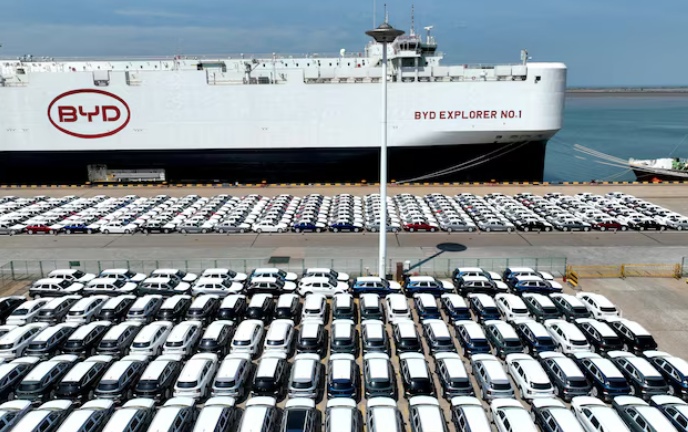The European Commission is imposing preliminary barrier duties on imports of electric cars made in China, the press office of the EU executive said.
The European Commission said on Thursday that the tariffs were imposed because of “unfair” government subsidies and will begin on Friday. However, there is a four-month period during which the tariffs are temporary and negotiations between the two sides are expected to continue.
The Commission, the EU’s executive arm, last year launched an investigation into Chinese electric car makers to see if state subsidies unfairly disadvantaged European carmakers.
Four months from now, when the investigation is complete, the Commission will be able to propose “certain duties” that will be in place for five years and voted on by the bloc’s 27 members.
The move raises duties from the current level of 10 per cent amid widening trade friction between the EU and China, especially on green technology.
The provisional duties of between 17.4 per cent and 37.6 per cent, with no refunds, are designed to prevent, according to Commission President Ursula von der Leyen, a threatened influx of cheap electric cars built with government subsidies.
The Chinese government has previously said it would take “all necessary measures” to protect the country’s interests, which could include retaliatory tariffs on exports to China of products such as cognac or pork.
America has already raised duties
The United States has already raised customs duties on Chinese electric vehicles to 100 per cent, and Canada is considering similar measures. He Yadong, a spokesperson for China’s Ministry of Commerce, said:
“There is still a four-month window before arbitration, and we hope that the European and Chinese sides will move in the same direction, show sincerity, and push forward with the consultation process as soon as possible.”
The duties on Chinese manufacturers include 17.4 per cent for BYD, 19.9 per cent for Geely and 37.6 per cent for SAIC, the EU said.
Companies deemed by the EU to have cooperated with the anti-subsidy investigation, including Western carmakers Tesla and BMW, will face tariffs of 20.8 per cent, while those who did not cooperate will face tariffs of 37.6 per cent.
The Commission estimates that the share of Chinese brands in the EU market has risen to 8 per cent from less than 1 per cent in 2019 and could reach 15 per cent in 2025.
Prices are about 20 per cent lower than those of models made in the EU, it said.
Volkswagen, Europe’s biggest carmaker, condemned the proposed tariffs and warned they would not strengthen the European auto industry in the long term. A Volkswagen spokesperson said in a statement:
“The negative effects of this decision outweigh any benefits for the European and especially the German automotive industry.”
